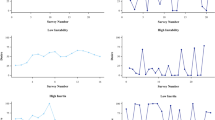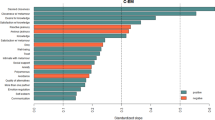Abstract
Robust associations between adverse childhood experiences and shortened telomere length exist, but few studies have examined factors that may moderate this association, particularly with a resilience framework. The present study examined the association between exposure to childhood sexual abuse (and abuse severity) and mean telomere length, and whether social support and optimism moderated this association. The sample included 99 White monozygotic female twins, ranging in age from 35 to 70 (Mage = 52.74, SD = 8.55 years), who provided a blood sample for telomere assay, and data on their childhood sexual abuse history, trait optimism, and current social support. Linear mixed effects models were employed to test study hypotheses. There were no effects of exposure to abuse or abuse severity on mean telomere length, nor were there main or moderating effects of optimism, in analyses of the full sample. However, in analyses that only included women exposed to abuse, there was an abuse type × support interaction: among women who experienced abuse in forms other than intercourse, higher levels of social support were associated with longer mean telomere length. Findings from the current study clarify the role of childhood sexual abuse in telomere attrition, and identify one factor that may protect against the negative biological effects of childhood sexual abuse.



Similar content being viewed by others
References
Asok, A., Bernard, K., Roth, T. L., Rosen, J. B., & Dozier, M. (2013). Parental responsiveness moderates the association between early-life stress and reduced telomere length. Development and Psychopathology, 25, 577–585. https://doi.org/10.1017/S0954579413000011
Barger, S. D., & Cribbet, M. R. (2016). Social support sources matter: Increased cellular aging among adults with unsupportive spouses. Biological Psychology, 115, 43–49. https://doi.org/10.1016/j.biopsycho.2016.01.003
Bates, D., Maechler, M., Bolker, B., & Walker, S. (2015). Fitting linear mixed-effects models using lme4. Journal of Statistical Software, 67, 1–48. https://doi.org/10.18637/jss.v067.i01
Beach, S. R. H., Lei, K., Brody, G., Yu, T., & Philibert, R. (2014). Nonsupportive parenting affects telomere length in young adulthood among African Americans: Mediation through substance use. Journal of Family Psychology, 28, 967–972. https://doi.org/10.1037/fam0000039
Berglund, K., Reynolds, C. A., Ploner, A., Gerritsen, L., Hovatta, I., Pedersen, N. L., et al. (2016). Longitudinal decline of leukocyte telomere length in old age and the association with sex and genetic risk. Aging, 8, 1398–1407. https://doi.org/10.18632/aging.100995
Blackburn, E. H. (2005). Telomeres and telomerase: Their mechanisms of action and the effects of altering their functions. FEBS Letters, 579, 859–862. https://doi.org/10.1016/j.febslet.2004.11.036
Blackburn, E. H., Greider, C. W., & Szostak, J. W. (2006). Telomeres and telomerase: The path from maize, Tetrahymena and yeast to human cancer and aging. Nature Medicine, 12, 1133–1138. https://doi.org/10.1038/nm1006-1133
Brody, G. H., Yu, T., Beach, S. R. H., & Philibert, R. R. A. (2015). Prevention effects ameliorate the prospective association between nonsupportive parenting and diminished telomere length. Prevention Science, 16, 171–180. https://doi.org/10.1007/s11121-014-0474-2
Browne, A., Finkelhor, D., Baron, L., Briere, J., Ellison, J., Friedrich, W., et al. (1986). Impact of child sexual abuse: A review of the research. Psychological Bulletin, 99, 66–77.
Carroll, J. E., Roux, A. V. D., Fitzpatrick, A. L., & Seeman, T. (2013). Low social support is associated with shorter leukocyte telomere length in late life: Multi-ethnic study of atherosclerosis (MESA). Psychosomatic Medicine, 75, 1–15. https://doi.org/10.1097/PSY.0b013e31828233bf
Cawthon, R. M. (2009). Telomere length measurement by a novel monochrome multiplex quantitative PCR method. Nucleic Acids Research, 37, 1–7. https://doi.org/10.1093/nar/gkn1027
Cohen, S., & Wills, T. A. (1985). Stress, social support, and the buffering hypothesis. Psychological Bulletin, 98, 310–357.
Fergusson, D. M., McLeod, G. F. H., & Horwood, L. J. (2013). Childhood sexual abuse and adult developmental outcomes: Findings from a 30-year longitudinal study in New Zealand. Child Abuse and Neglect, 37, 664–674. https://doi.org/10.1016/j.chiabu.2013.03.013
Glass, D., Parts, L., Knowles, D., Aviv, A., & Spector, T. D. (2010). No correlation between childhood maltreatment and telomere length. Biological Psychiatry, 68, e21–e22. https://doi.org/10.1016/j.biopsych.2010.02.026
Haycock, P. C., Heydon, E. E., Kaptoge, S., Butterworth, A. S., Thompson, A., & Willeit, P. (2014). Leucocyte telomere length and risk of cardiovascular disease: Systematic review and meta-analysis. British Medical Journal, 349, 1–11. https://doi.org/10.1136/bmj.g4227
Holt-Lunstad, J., Smith, T. B., & Layton, J. B. (2010). Social relationships and mortality risk: A meta-analytic review. PLOS Medicine, 7, 1–20. https://doi.org/10.1371/journal.pmed.1000316
Hyman, S. M., Gold, S. N., & Cott, M. A. (2003). Forms of social support that moderate PTSD in childhood sexual abuse survivors. Journal of Family Violence, 18, 295–300. https://doi.org/10.1023/A:1025117311660
Irish, L., Kobayashi, I., & Delahanty, D. L. (2010). Long-term physical health consequences of childhood sexual abuse: A meta-analytic review. Journal of Pediatric Psychology, 35, 450–461. https://doi.org/10.1093/jpepsy/jsp118
Kendler, K. S., & Prescott, C. A. (2006). Genes, environment, and psychopathology: Understanding the causes of psychiatric and substance use disorders. New York, NY: Guilford Press.
Kiecolt-Glaser, J. K., Gouin, J., Weng, N., Malarkey, W. B., Beversdorf, D. Q., & Glaser, R. (2011). Childhood adversity heightens the impact of later-life caregiving stress on telomere length and inflammation. Psychosomatic Medicine, 73, 16–22. https://doi.org/10.1097/PSY.0b013e31820573b6
Lazarus, R. S., & Folkman, S. (1984). Stress, appraisal, and coping. New York, NY: Springer.
Mason, S. M., Prescott, J., Tworoger, S. S., DeVivo, I., & Rich-Edwards, J. W. (2015). Childhood physical and sexual abuse history and leukocyte telomere length among women in middle adulthood. PLoS ONE, 10, 1–12. https://doi.org/10.1371/journal.pone.0124493
Mullen, P. E., Martin, J. L., Anderson, J. E., Romans, S. E., & Herbison, G. P. (1993). Childhood sexual abuse and mental health in adult life. British Journal of Psychiatry, 163, 721–732. https://doi.org/10.1192/bjp.163.6.721
O’Donovan, A., Epel, E., Lin, J., Wolkowitz, O., Cohen, B., Metzler, T., et al. (2011). Childhood trauma associated with short leukocyte telomere length in post-traumatic stress disorder. Biological Psychiatry, 70, 465–471. https://doi.org/10.1016/j.biopsych.2011.01.035
Oliveira, B., Zunzunegui, M. V., Quinlan, J., Fahmi, H., Tu, M. T., & Guerra, R. (2016). Systematic review of the association between chronic social stress and telomere length: A life course perspective. Ageing Research Reviews, 26, 37–52. https://doi.org/10.1016/j.arr.2015.12.006
Price, L. H., Kao, H. T., Burgers, D. E., Carpenter, L. L., & Tyrka, A. R. (2013). Telomeres and early-life stress: An overview. Biological Psychiatry, 73, 15–23. https://doi.org/10.1016/j.biopsych.2012.06.025
Rasmussen, H. N., Scheier, M. F., & Greenhouse, J. B. (2009). Optimism and physical health: A meta-analytic review. Annals of Behavioral Medicine, 37, 239–256. https://doi.org/10.1007/s12160-009-9111-x
R Core Team. (2017). R: A language and environment for statistical computing. R Foundation for Statistical Computing, Vienna, Austria. Retrieved from https://www.R-project.org/
Scheier, M. F., & Carver, C. S. (1985). Optimism, coping, and health: Assessment and implications of generalized outcome expectancies. Health Psychology, 4, 219.
Schutte, N. S., Palanisamy, S. K. A., & McFarlane, J. R. (2016). The relationship between positive psychological characteristics and longer telomeres. Psychology & Health, 446, 1–15. https://doi.org/10.1080/08870446.2016.1226308
Shalev, I., Moffitt, T. E., Sugden, K., Williams, B., Houts, R. M., Danese, A., et al. (2013). Exposure to violence during childhood is associated with telomere erosion from 5 to 10 years of age: A longitudinal study. Molecular Psychiatry, 18, 576–581. https://doi.org/10.1038/mp.2012.32
Slagboom, P. E., Droog, S., & Boomsma, D. I. (1994). Genetic determination of telomere size in humans: A twin study of three age groups. American Journal of Human Genetics, 55, 876–882.
Smith, T. W. (2006). Personality as risk and resilience in physical health. Current Directions in Psychological Science, 15, 227–231. https://doi.org/10.1111/j.1467-8721.2006.00441.x
Smith, T. W., & MacKenzie, J. (2006). Personality and risk of physical illness. Annual Reviews in Clinical Psychology, 2, 435–467. https://doi.org/10.1146/annurev.clinpsy.2.022305.095257
Spitzer, R. L., Williams, J. B., & Gibbon, M. (1987). Structured Clinical Interview for DSM-III-R. New York: New York State Psychiatric Institute Biometrics Research Department.
Starkweather, A. R., Alhaeeri, A. A., Montpetit, A., Brumelle, J., Filler, K., Montpetit, M., et al. (2014). An integrative review of factors associated with telomere length and implications for biobehavioral research. Nursing Research, 63, 36–50. https://doi.org/10.1097/NNR.0000000000000009
Taylor, S. E. (2010). Mechanisms linking early life stress to adult health outcomes. Proceedings of the National Academy of Sciences of the United States of America, 107, 8507–8512. https://doi.org/10.1073/pnas.1003890107
Tyrka, A. R., Price, L. H., Kao, H., Marsella, S. A., & Carpenter, L. L. (2011). Childhood maltreatment and telomere shortening: Preliminary support for an effect of early stress on cellular aging. Biological Psychology, 67, 531–534. https://doi.org/10.1016/j.biopsych.2009.08.014
Ullman, S. E. (1999). Social support and recovery from sexual assault: A review. Aggression and Violent Behavior, 4, 343–358. https://doi.org/10.1016/S1359-1789(98)00006-8
Wegman, H. L., & Stetler, C. (2009). A meta-analytic review of the effects of childhood abuse on medical outcomes in adulthood. Psychosomatic Medicine, 71, 805–812. https://doi.org/10.1097/PSY.0b013e3181bb2b46
World Health Organization. (2016). Child maltreatment. Retrieved January 1, 2017 from http://www.who.int/mediacentre/factsheets/fs150/en/
Zalli, A., Carvalho, L. A., Lin, J., Hamer, M., Erusalimsky, J. D., Blackburn, E. H., et al. (2014). Shorter telomeres with high telomerase activity are associated with raised allostatic load and impoverished psychosocial resources. Proceedings of the National Academy of Sciences of the United States of America, 111, 4519–4524. https://doi.org/10.1073/pnas.1322145111
Funding
This study was funded by the National Institute on Aging Grant R01AG037986 awarded to Dr. Colleen Jackson-Cook and Dr. Timothy P. York. The study was approved by the Virginia Commonwealth University Institutional Review Board (#12407).
Author information
Authors and Affiliations
Corresponding author
Ethics declarations
Conflict of interest
David W. Sosnowski, Wendy Kliewer, Timothy P. York, Ananda B. Amstadter, Colleen K. Jackson-Cook, and Marcia A. Winter declare that they have no conflict of interest.
Ethical approval
All procedures performed in studies involving human participants were in accordance with the ethical standards of the institutional and/or national research committee and with the 1964 Helsinki declaration and its later amendments or comparable ethical standards.
Human and animal rights and Informed consent
All procedures followed were in accordance with ethical standards of the responsible committee on human experimentation (institutional and national) and with the Helsinki Declaration of 1975, as revised in 2000. Informed consent was obtained from all individual participants included in the study.
Additional information
Publisher's Note
Springer Nature remains neutral with regard to jurisdictional claims in published maps and institutional affiliations.
Rights and permissions
About this article
Cite this article
Sosnowski, D.W., Kliewer, W., York, T.P. et al. Familial support following childhood sexual abuse is associated with longer telomere length in adult females. J Behav Med 42, 911–923 (2019). https://doi.org/10.1007/s10865-019-00014-7
Received:
Accepted:
Published:
Issue Date:
DOI: https://doi.org/10.1007/s10865-019-00014-7




